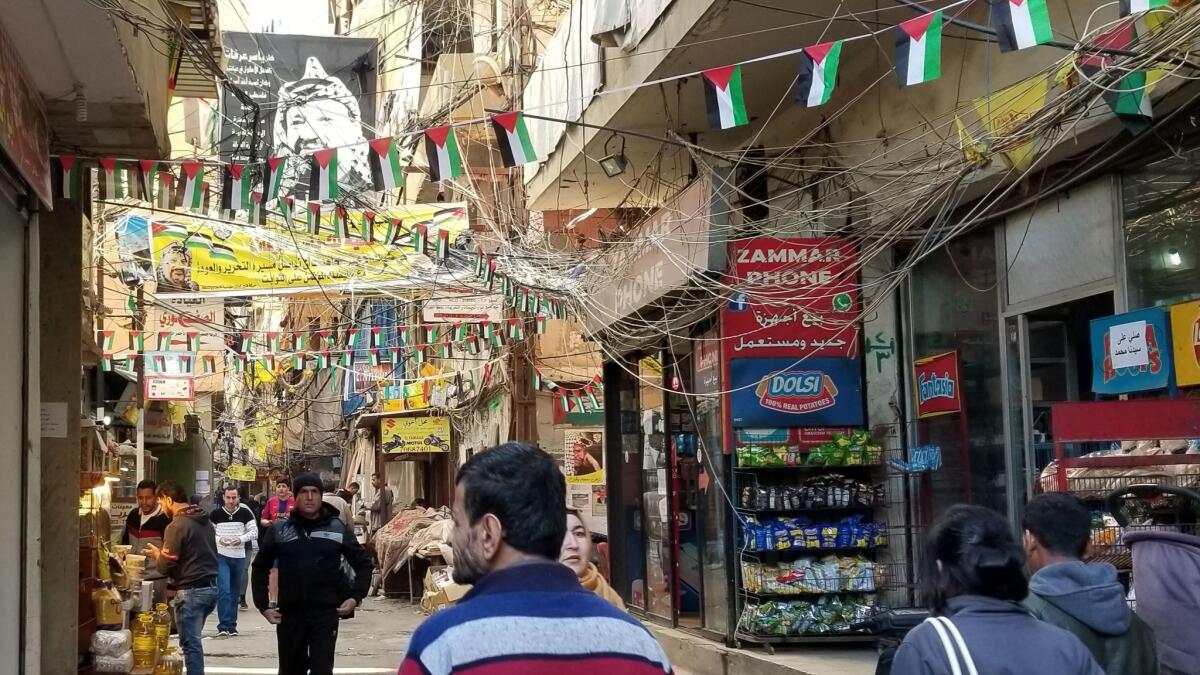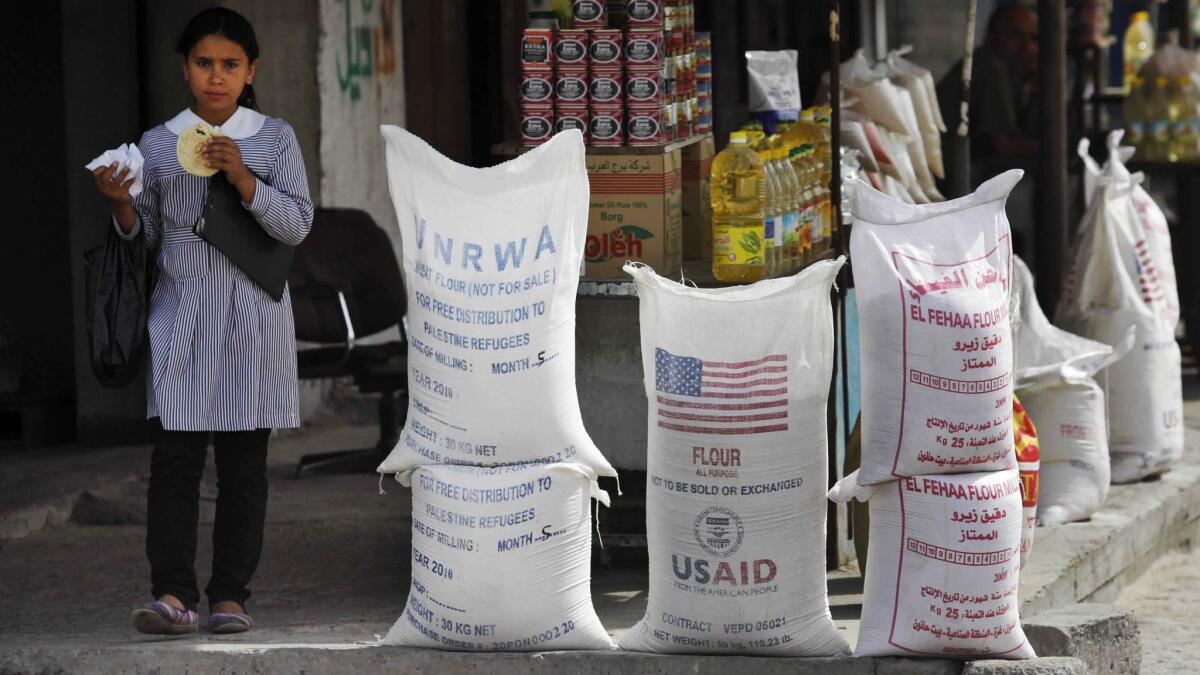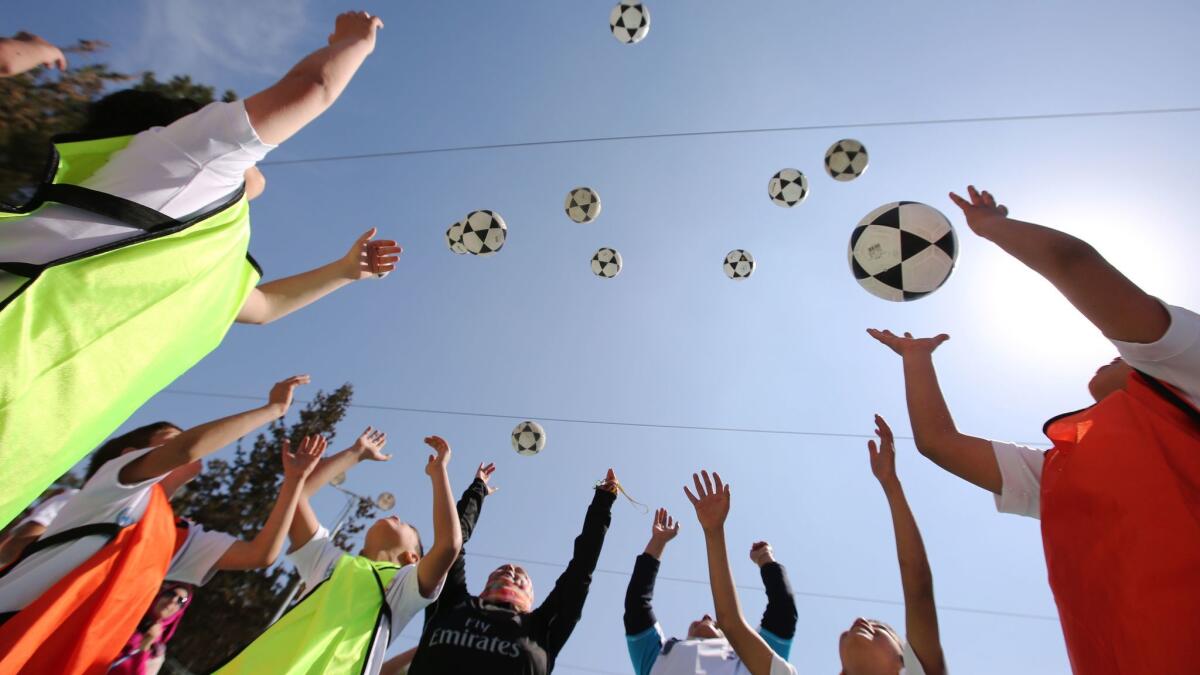In Palestinian territories — and in Israel — jitters over Trump’s threat to cut aid to Palestinians

- Share via
Reporting from GAZA CITY — In the Gaza Strip’s impoverished refugee camps, the United Nations’ blue-and-white flag is ubiquitous, fluttering over schools, clinics and food distribution centers.
It is in these teeming streets and alleys that President Trump’s threat to block millions of dollars in funding for Palestinians probably would be felt the most. Much of that aid goes to the U.N. agency that works with Palestinian refugees, and almost everyone here relies on the services it provides.
Palestinian leaders accused the administration of “blackmail” after Trump and his U.N. ambassador, Nikki Haley, suggested last week that the administration might freeze U.S. aid if they don’t resume peace talks with Israel. But the threats also raised alarm among Israelis who have been some of fiercest critics of the U.N. Relief and Works Agency for Palestine Refugees in the Near East, or UNRWA.
Members of the Israeli defense establishment warned that any sudden loss of aid to Palestinians could undermine Palestinian leaders who cooperate with Israel on security matters and could help extremists by worsening the already desperate conditions faced by more than 2 million people registered as refugees in Gaza and the West Bank.

“If the funds to UNRWA stop, this will be a death sentence for my family,” said Huda Talba, 46, whose family of nine is packed into a two-bedroom house in Gaza’s “Beach” refugee camp.
Talba’s husband, a builder, hasn’t been able to work since a fall on a job site 15 years ago. So the family depends on monthly food packages and about $514 in cash assistance that UNRWA provides every three months. Five of the couple’s seven children attend schools operated by the U.N. agency. And family members go to an UNRWA health center for treatment whenever they get sick.
“Why do we have to pay the price of the American-Abbas problems?” Talba said, referring to the standoff between Trump and Palestinian Authority President Mahmoud Abbas. “It’s collective punishment.”
Trump’s decision last month to formally recognize Jerusalem as Israel’s capital caused outrage among Palestinians, who claim part of the city as the capital of a future independent state. The announcement, which upended decades of U.S. policy, led Abbas to declare that Washington no longer has a role to play in brokering what Trump has called the “ultimate deal”: peace between Israel and Palestinians.
“We pay the Palestinians HUNDRED OF MILLIONS OF DOLLARS a year and get no appreciation or respect,” Trump complained in a pair of tweets Tuesday. “With the Palestinians no longer willing to talk peace, why should we make any of these massive future payments to them?”
Trump did not specify what aid he had in mind. The U.S. also provides support to Palestinians through the U.S. Agency for International Development.
But when Haley was asked Tuesday about U.S. aid for UNRWA, she said the president “doesn’t want to give any additional funding until the Palestinians agree to come back to the negotiation table.”
An official familiar with the matter said the administration failed to make an expected $120-million disbursement to UNRWA that day. But the U.S. has not formally notified the organization of a final decision on whether funding would be discontinued or maintained.
“There are still deliberations taking place, and we have missed no deadline,” a State Department official said Saturday.
The U.S. is UNRWA’s largest single donor, contributing about a third of the organization’s budget, or more than $350 million annually.
Some Israeli politicians have pressed Washington to curtail the funding, arguing that UNRWA’s schools have been used by Hamas militants in Gaza to conceal tunnels and rockets intended for use in attacks on Israel.
“Its very existence perpetuates the dire situation of Gaza’s population, who suffer under the rule of Hamas,” Israeli Education Minister Naftali Bennett, leader of the ultranationalist Jewish Home party, said in a statement last week.
Others, however, worry that without help from UNRWA, Palestinian refugees will become more susceptible to recruitment efforts by Hamas and other militant factions.
“While UNRWA is far from perfect, the Israeli defense establishment, and the Israeli government as a whole, have over the years come to the understanding that all the alternatives are worse,” Peter Lerner, a former spokesman for the Israeli military, wrote in an opinion piece in Haaretz newspaper.
Behind the scenes, Israeli and Palestinian officials have worked closely to prevent terrorist attacks in Israeli territory, and Israel does not want to see that cooperation compromised. Some Palestinian factions already accuse Abbas, who is struggling politically, of colluding with the enemy.
On Sunday, in another sign of cooperation, Israel announced that it would renew electricity supplies to Gaza, six months after cutting them off.
But Israel would not welcome having to provide the kinds of services financed by U.S. aid to UNRWA. The organization runs 359 schools, providing an education to 290,000 children in Gaza and the West Bank. Its doctors provide 6.2 million consultations annually, and it distributes food and cash assistance to more than 1 million vulnerable refugees.
Gershon Baskin, who is co-chairman of the think tank Israel-Palestine: Creative Regional Initiatives, argues that Palestinian officials should take charge of Palestinian schools. But he questions the wisdom of any cuts that could jeopardize education.

“These are schools that are already at a breaking point, running on double shifts,” he said. “So the principal population to suffer if this goes through would be kids. And also, from an Israeli security point of view, I’m not sure that having hundreds of thousands of kids at loose ends is very good.”
Even with U.S. support, UNRWA has faced chronic shortfalls in funding over the years and in 2015 came perilously close to delaying the start of the school year. The agency’s spokesman, Chris Gunness, said the fallout from a funding cutoff could be “profound, long-lasting, dramatic and unpredictable.”
“The human impact of this could be catastrophic; the implications of this on regional stability are incalculable,” he said in an email.
In addition to its work in Gaza and the West Bank, the organization provides services to about 3 million Palestinian refugees in Jordan, Lebanon and Syria, where camps have evolved into de-facto neighborhoods, albeit ones beset by chronic overcrowding, sub-par housing and rickety infrastructure.
From the Times’ archives, 1988: U.N. Aid Agency Walking a Tightrope in West Bank, Gaza »
In Shatila, a camp in the Lebanese capital, Beirut, residents navigate a maze of narrow streets riddled with potholes, walking past ramshackle buildings of exposed cinder block, walls plastered with posters of Abbas and the late Palestinian leader Yasser Arafat. Suspended above the streets is a shambolic canopy of electric wires that deliver a few hours of power a day.
“Palestinians live in terrible conditions here, and it’s already a catastrophe,” said Amina Hassanein, a 45-year-old resident. “Without UNRWA, we’ll go down to zero.”
For others, UNRWA serves a more existential purpose.
“There is no witness to the tragedy of the Palestinian people other than UNRWA,” said Mohammad Afifi, a 58-year-old shopkeeper who was born and raised in Shatila. “I hold on to UNRWA because I hold on to my right of returning to Palestine.”
Indeed, most of those currently registered as Palestinian refugees are descendants of those displaced by the 1948 Arab-Israeli war, with little personal connection to the land that Israel now claims, even if their families still hold on to the keys of their former homes.
“This absurdity needs to stop,” Israeli Prime Minister Benjamin Netanyahu said at the start of the weekly Cabinet meeting Sunday. “UNRWA is an organization that perpetuates the Palestinian refugee problem.”
Still, he said he would prefer that funding for UNRWA be gradually shifted to the Office of the U.N. High Commissioner for Refugees. “This is how to rid the world of UNRWA and deal with genuine refugee problems, to the extent that such remain,” Netanyahu said.
UNRWA officials reject the contention that the agency has contributed to the conflict. “What perpetuates the refugee crisis is the failure of the parties to deal with the issue,” Gunness said.
ALSO
Organizations that promote a boycott of Israel are no longer welcome there
Israel’s transportation minister offers Trump a gift: A train station at the Western Wall
Times staff writer Zavis reported from Beirut and special correspondents Tarnopolsky and Abu Alouf from Jerusalem and Gaza City, respectively. Special correspondent Nabih Bulos in Beirut and Times staff writer Tracy Wilkinson in Washington contributed to this report.
Twitter: @alexzavis
More to Read
Sign up for Essential California
The most important California stories and recommendations in your inbox every morning.
You may occasionally receive promotional content from the Los Angeles Times.











